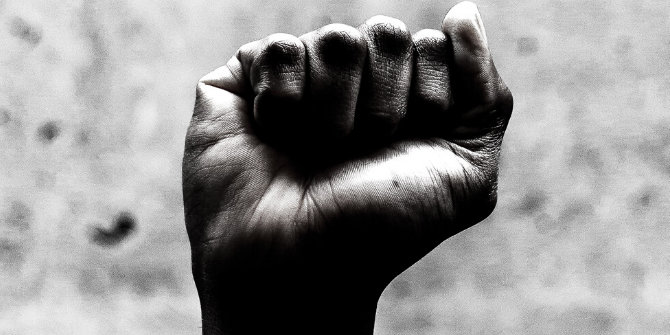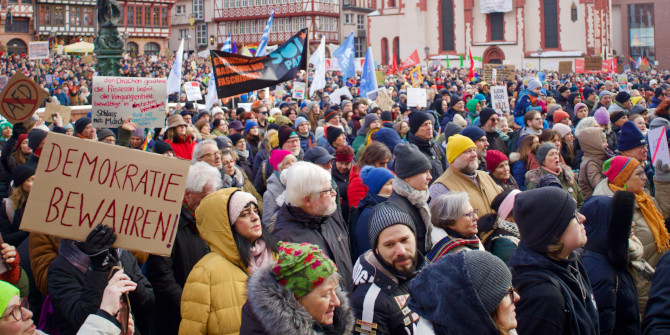 Romania will hold presidential elections in November, with the country’s centre-left Prime Minister, Victor Ponta, currently ahead in the polls. Roxana Mihaila writes that the main dynamic in the campaign so far has been an intra-party struggle on the centre-right over the candidate chosen to run against Ponta, with Romania’s incumbent President Traian Basescu unable to stand for a third term.
Romania will hold presidential elections in November, with the country’s centre-left Prime Minister, Victor Ponta, currently ahead in the polls. Roxana Mihaila writes that the main dynamic in the campaign so far has been an intra-party struggle on the centre-right over the candidate chosen to run against Ponta, with Romania’s incumbent President Traian Basescu unable to stand for a third term.
The Romanian Presidential election, scheduled in two rounds for 2 and 16 November 2014 respectively, promises to be a race to the bottom. The contest will take place in a political climate laced with corruption scandals and high-profile convictions, early allegations of potential electoral fraud and a very fragmented party system. As was the case in the 2009 election round, the position has again attracted a considerable number of candidates, with the Social Democratic Party currently in government seemingly in the lead and the two largest parties on the right – the National Liberal Party and the Democratic Liberal Party – in close contest. The electoral scene is quite populated, with potential candidates from smaller parties – the Democratic Union of Hungarians in Romania, extreme right Greater Romania Party, Green Party and the People’s Party – Dan Diaconescu – also in the running.

The scene for the November contest had already been set earlier in May, with the EP elections played out as a trial run for the presidential ones, focused on the ‘presidential’ party members rather than the actual MEP candidates. In the aftermath of the EP election, three candidates were credited with winning potential: on the left, current Prime Minister Victor Ponta on behalf of the Social Democratic Party; and National Liberal Party leader Crin Antonescu and ex-tourism minister Elena Udrea (Popular Movement Party), both on the right of the political spectrum.
While the Social Democrats performed quite well in May (a little over 37 per cent of the votes), the strongest contenders on the right – the National Liberal Party and the Democratic Liberal Party – succumbed to one of their poorest performances in years (20 and 15 per cent of votes respectively). The clear lead of the Social Democrats and the popularity they seem to have preserved since have made Ponta an apparent favourite in the Presidential race. The latest polls conducted in July 2014 put him ahead of any candidate on the right, but this is now moot in view of the recent reshuffles and influx of candidates on the right.
In spite of calls for a genuine, cohesive political formation on the centre-right framed around the National Liberal Party and the Democratic Liberal Party (together, the Christian Liberal Union), to counterbalance the lead of the Social Democrats, the current array of candidates belies this ambition. Internal party conflicts, political migration and political scandals have generated a much more fragmented political scene than at the time of the EP elections. The process of nominating a common candidate of the right was marred by independent candidacies from disgruntled party members, broken alliances and accusations of mismanagement and corruption. The current line-up constitutes a ‘redux’ version of the ‘united right’ politicians had envisaged just months ago.
Each of the two constituent parties of the Christian-Liberal Union first voted on a potential candidate and then commissioned a sociological study to test which of the two candidates would fare better against a candidate from the left. As a consequence, Crin Antonescu, one of the favourites in May, lost his nomination from the National Liberal Party to Klaus Iohannis, who then faced the Democrat Liberal Party’s nominee Catalin Predoiu in the polling exercise. After postponing the announcement of their common candidate, citing delays in interpreting the results of the polls, the alliance finally made public in mid-August the name of Iohannis.
This is not the first time Iohannis’ name has come up for high ranking posts, as he was proposed as prime minister in 2009 by four out of the five parliamentary groups, including the Social Democratic Party and the National Liberal Party. After four mandates as mayor of one of the most prosperous cities in the country, Iohannis, former president of the German Democratic Forum in Romania, has gained a strong reputation for administration and leadership and has a credible chance against Ponta in the upcoming contest. His agenda centres on economic issues and youth employment, education reform, a rapprochement with the EU and the US, and a concrete growth strategy, promoting a clearer message than the mainly anti-Basescu discourse employed by Ponta.
Yet this nomination has unfolded into a series of events which undermine the electoral potential of the right. Current member of the European Parliament Monica Macovei (Democrat Liberal Party) decided to run as an independent approximately two weeks after her party refused to consider her as a potential candidate. Her move could rally behind her the faction of the Democrat Liberal Party which was not excited about the union with the liberals to begin with, and thus bring the party’s votes down. Former National Liberal Party president Calin Popescu Tariceanu’s also shifted his position and will run under the umbrella of the recently created Reformist Liberal Party, raising concerns over the share of supporters he would take with him.
A similar turn of events derailed the People’s Movement Party’s (a splinter of the Democratic Liberal Party supported by President Basescu) electoral plans. Presidential hopeful Cristian Diaconescu resigned from the party amidst internal wrangling over his visibility and popularity compared to that of fellow member Elena Udrea, who is now the party’s official candidate. Her campaign will be centred on her performances as tourism and environment minister respectively, yet the message essentially remains an anti-Ponta one – the People’s Movement must secure the presidency to prevent the Social Democratic Party from taking hold.
These fissures of the right make it difficult for voters to discern clearly between candidates of the ‘liberal’ variety. The sketchy political trajectory of most candidates – who have often migrated effortlessly between parties on opposite sides of the political spectrum – could end up simply confusing the electorate. This situation is aggravated by the similarities between these candidates’ electoral messages, which are centred mostly on personality rather than governance issues, betraying their superficiality.
The messages end up as variations on the same theme – unsubstantiated statements on how either candidate will ‘save’ the country from the influence of President Basescu and Prime Minister Victor Ponta and their protégés respectively. Themes such as austerity measures, EU funding, the recent Social Democrat proposal on lowering social contributions, or geopolitics are turned around into performance issues and absorbed into this discourse. This is the first time in a presidential campaign however when the matter of religion is broached, with reference to the religious orientation of the Christian Liberal Union’s candidate Klaus Iohannis. The frequency of religious holidays around the time the candidacies were announced worked in favour of most of Iohannis’ opponents, who speculated on the appropriateness of voting for a president who does not belong to the Christian-orthodox majority in the country.
A parallel line of contestation is the perpetual issue of corruption. Recent convictions in high-profile cases have exposed some of the candidates’ connections to embezzlement files and undue influence accusations, and have fuelled a debate on the revision of the laws regulating Presidential pardons in such cases. Rather than a forum for discursive deliberations, the current political climate has seen the candidates immersed in an all-out battle to discredit each other, which sets the scene for a very virulent electoral campaign.
The image of current President Basescu is at the centre of these scandals, as his brother’s name is one of the most recent on the prosecutors’ list of indictments. In turn, President Basescu has been using the poor performance of the economy under the Ponta government to discredit Ponta as impulsive, inexperienced, and unfit for presidential office. The remaining candidates are manipulating this conflict to position themselves as the antithesis to the images projected by the two.
This line of argumentation is at the crux of the current debates – a battle of personalities rather than tangible electoral platforms. The campaign is likely to end up as a clash of the titans, Romanian style: little substance, a highly mediatised contest, and last minute candidate reshuffles.
Please read our comments policy before commenting.
Note: This article gives the views of the author, and not the position of EUROPP – European Politics and Policy, nor of the London School of Economics.
Shortened URL for this post: http://bit.ly/1uPADP6
_________________________________
 Roxana Mihaila – University of Sussex
Roxana Mihaila – University of Sussex
Roxana Mihaila is a Doctoral Researcher and Associate Tutor at the Sussex European Institute, University of Sussex. Her dissertation looks at the role of national political parties in EU decision-making, with a focus on the Lisbon and Fiscal Compact treaties. Her research interests include political parties, EU integration and decision-making; Europeanization; comparative European politics; comparative research methods. She tweets @roxana_mihaila





Good post Roxana, but in two places you refer to PNL si PDL as left-wing parties:
“the two largest parties on the left – the National Liberal Party and the Democratic Liberal Party” and “the strongest contenders on the left – the National Liberal Party and the Democratic Liberal Party”.
You might want to correct that.
Then, who is the National Democratic Party, which forms with the PNL the Christian Liberal Union? You probably meant the Democratic Liberal Party.
Paul,many thanks for the read and for flagging this up. Writer’s blindness at its best – amended accordingly.